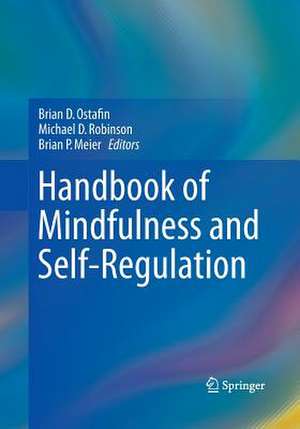Handbook of Mindfulness and Self-Regulation
Editat de Brian D. Ostafin, Michael D. Robinson, Brian P. Meieren Limba Engleză Paperback – 23 aug 2016
Included in the Handbook:
- Mindfulness and its role in overcoming automatic mental processes
- Burning issues in dispositional mindfulness research
- Self-compassion: what it is, what it does, and how it relates to mindfulness
- Mindfulness-based cognitive therapy and mood disorders
- Mindfulness as a general ingredient of successful psychotherapy
- The emperor's clothes: a look behind the Western mindfulness mystique
| Toate formatele și edițiile | Preț | Express |
|---|---|---|
| Paperback (1) | 1819.47 lei 6-8 săpt. | |
| Springer – 23 aug 2016 | 1819.47 lei 6-8 săpt. | |
| Hardback (1) | 1877.12 lei 6-8 săpt. | |
| Springer – 13 oct 2015 | 1877.12 lei 6-8 săpt. |
Preț: 1819.47 lei
Preț vechi: 1915.23 lei
-5% Nou
Puncte Express: 2729
Preț estimativ în valută:
348.19€ • 361.31$ • 291.03£
348.19€ • 361.31$ • 291.03£
Carte tipărită la comandă
Livrare economică 15-29 martie
Preluare comenzi: 021 569.72.76
Specificații
ISBN-13: 9781493942909
ISBN-10: 1493942905
Pagini: 301
Ilustrații: VII, 301 p. 11 illus., 2 illus. in color.
Dimensiuni: 178 x 254 x 25 mm
Greutate: 5.89 kg
Ediția:Softcover reprint of the original 1st ed. 2015
Editura: Springer
Colecția Springer
Locul publicării:New York, NY, United States
ISBN-10: 1493942905
Pagini: 301
Ilustrații: VII, 301 p. 11 illus., 2 illus. in color.
Dimensiuni: 178 x 254 x 25 mm
Greutate: 5.89 kg
Ediția:Softcover reprint of the original 1st ed. 2015
Editura: Springer
Colecția Springer
Locul publicării:New York, NY, United States
Cuprins
The Science of Mindfulness and Self-Regulation.- Part I: Neuroscience and Cognitive Perspectives.- The Emerging Neurobiology of Mindfulness and Emotion Processing.- Mindfulness and training attention.- Mindfulness, Attention, and Working Memory.- Mindfulness and its role in overcoming automatic mental processes.- Part II: Personality and Social Psychology Perspectives.- Burning issues in dispositional mindfulness research.- The “Why”, “What”, and “How” of healthy self-regulation: Mindfulness and well-being from a self-determination theory perspective.- Self-Regulatory Strength and Mindfulness.- Mindfulness and emotion regulation.- What it is, what it does, and how it relates to mindfulness.- Part III: Clinical Perspectives.- Mindfulness as a Key Construct in Modern Psychotherapy.- How Do Mindfulness-Based Interventions Work? Strategies for Studying Mechanisms of Change in Clinical Research.- Mindfulness-based Cognitive Therapy and Mood Disorders.- Mindfulness and the addictive process: Psychological models and neurobiological mechanisms.- Mindfulness, Eating Disorders and Food Intake Regulation.- Mindfulness and self-regulation: A medical approach to the mind and mental health.- Mindfulness as a general ingredient of successful psychotherapy.- Part IV: Buddhist Perspectives.- Buddhist Styles of Mindfulness: A Heuristic Approach.- The Emperor’s clothes: A look behind the Western mindfulness mystique.
Notă biografică
Brian D. Ostafin, PhD, is an associate professor in the experimental psychopathology and clinical psychology program at the University of Groningen, The Netherlands. He received his doctorate in clinical psychology from Boston University in 2004. His research focuses on the role of implicit processes in psychopathology (with an emphasis on addictive behaviors) and the usefulness of mindfulness interventions to overcome such processes. This work has been funded by the NIH and other agencies.
Michael D. Robinson, PhD, is a Professor of Psychology at North Dakota State University. He received his doctorate in social psychology from the University of California, Davis, in 1996. Subsequently, he was trained in a three-year NIMH-supported postdoctoral position, working during this time with Richard J. Davidson and Gerald L. Clore. He is a prolific researcher in the areas of personality, assessment, self-regulation, cognition, and emotion. In addition, his work has been funded by NSF and NIH. He has been or is an Associate Editor for Cognition and Emotion, Emotion, Journal of Personality, Journal of Personality and Social Psychology, and Social and Personality Psychology Compass (emotion/motivation section). In addition, he has edited two recent books: Handbook of Cognition and Emotion (Robinson, Watkins, & Harmon-Jones, 2013; Guilford Press) and The Power of Metaphor (Landau, Robinson, & Meier, 2014; American Psychological Association). He is considered an expert in implicit approaches to personality and in cognitive approaches to emotion and self-regulation.
Brian P. Meier, PhD, is an associate professor of psychology at Gettysburg College, where he teaches courses on general psychology, social psychology, and statistics. He received his doctorate in social psychology from North Dakota State University in 2005. His research is focused on social and personality psychologytopics including mindfulness, self-regulation, embodiment, emotion, aggression, and prosocial behavior. Dr. Meier is a consulting editor for multiple journals and his research has been funded by multiple agencies.
Michael D. Robinson, PhD, is a Professor of Psychology at North Dakota State University. He received his doctorate in social psychology from the University of California, Davis, in 1996. Subsequently, he was trained in a three-year NIMH-supported postdoctoral position, working during this time with Richard J. Davidson and Gerald L. Clore. He is a prolific researcher in the areas of personality, assessment, self-regulation, cognition, and emotion. In addition, his work has been funded by NSF and NIH. He has been or is an Associate Editor for Cognition and Emotion, Emotion, Journal of Personality, Journal of Personality and Social Psychology, and Social and Personality Psychology Compass (emotion/motivation section). In addition, he has edited two recent books: Handbook of Cognition and Emotion (Robinson, Watkins, & Harmon-Jones, 2013; Guilford Press) and The Power of Metaphor (Landau, Robinson, & Meier, 2014; American Psychological Association). He is considered an expert in implicit approaches to personality and in cognitive approaches to emotion and self-regulation.
Brian P. Meier, PhD, is an associate professor of psychology at Gettysburg College, where he teaches courses on general psychology, social psychology, and statistics. He received his doctorate in social psychology from North Dakota State University in 2005. His research is focused on social and personality psychologytopics including mindfulness, self-regulation, embodiment, emotion, aggression, and prosocial behavior. Dr. Meier is a consulting editor for multiple journals and his research has been funded by multiple agencies.
Textul de pe ultima copertă
This empirically robust resource examines multiple ways mindfulness can be harnessed to support self-regulation, in part as a real-world component of therapy. Its authoritative coverage approaches complex mind/brain connections from neuroscience, cognitive, personality, social, clinical, and Buddhist perspectives, both within and outside traditional meditation practice. In domains such as letting go of harmful habits and addictions, dealing with depression and anxiety, regulating emotions, and training cognitive function, contributors show how mindfulness-based interventions encourage and inspire change. In addition to scientific coverage, experts translate their methods and findings on mindfulness mechanisms in terms that are accessible to students and clinicians.
Included in the Handbook:
Included in the Handbook:
- Mindfulness and its role in overcoming automatic mental processes
- Burning issues in dispositional mindfulness research
- Self-compassion: what it is, what it does, and how it relates to mindfulness
- Mindfulness-based cognitive therapy and mood disorders
- Mindfulness as a general ingredient of successful psychotherapy
- The emperor's clothes: a look behind the Western mindfulness mystique
Caracteristici
Brings diverse lines of mindfulness research together in one volume Presents leading thinkers, like Steven C. Hayes, in this field Provides foundation for evidence-based practice Focuses on self-regulation aspects of mindfulness












